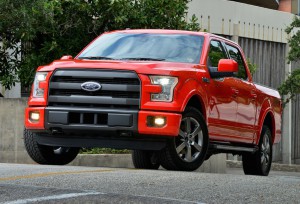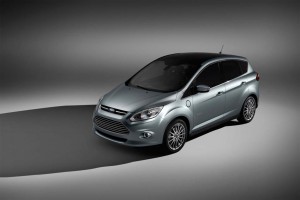
Ford's 2015 F-150 4x2 with Ford’s 2.7-liter EcoBoost engine has EPA-estimated ratings of 22 mpg Combined.
With gasoline prices plummeting below $3 a gallon in much of the country – and with further cuts expected – American motorists are shifting gears. November’s booming sales numbers were given strong momentum by the resurgent demand for fuel-hungry pickups, SUVs vans and even muscle cars.
Ironically, that’s not entirely good news for automakers like Ford Motor Co. On the positive side, sales of the new 2015 Mustang nearly doubled over last year’s volume, and Ford has a massive backlog of orders for its new F-150 pickup, the most profitable model in its portfolio.
But plunging pump prices also create some serious challenges, cautioned Raj Nair, Ford’s global product development chief.
“Certainly, low fuel prices make it hard to sell some vehicles like hybrids and electrics,” he said during a lunch at the Ford test track near the maker’s headquarters in Dearborn, Michigan.
(New 2015 Ford Mustang regains lead over Chevy Camaro. Click Here for more.)
That might not seem all that bad, considering vehicles like the Ford Focus Electric and C-Max Energi generate little in the way of profits – and more typically run well into the red for each vehicle Ford sells. But these battery-based models are critical to Ford’s environmental strategy. Without them, Nair acknowledged, Ford will have problems meeting both the federal Corporate Average Fuel Economy, or CAFE, standards, and California’s even tougher Zero-Emissions Vehicle, or ZEV, mandate.
In fact, if it doesn’t sell enough zero-emissions products in the Golden State it could be blocked from selling any of its products there.
But in a wide-ranging discussion, he said “the low price of gas makes the payback harder to sell” for all battery-based vehicles, whether conventional hybrids, plug-ins or pure battery-electric vehicles, like the Focus Electric.
Ford recently slashed the price of the electric Focus by $6,000, its second cut in a year, but demand continues to wane. And that’s not a problem unique to Ford.
The most immediate challenge the maker faces is to predict whether the current, downward fuel price spiral is a short-term trend or something longer-term. If it’s likely to be temporary, Ford and its competitors could use price cuts and other incentives to prop up demand. If it’s likely to stretch on, that’s another matter, and it would require rethinking ongoing product development programs, Nair noted.
Ford was one of the first automakers to openly embrace the push for cleaner vehicles, especially those relying on advanced lithium-ion battery technology. Chairman Bill Ford has been outspoken in his belief that global warming is a serious issue the auto industry must address. And that isn’t about to change, said Nair, insisting that Ford’s product plans will continue to be based around doing “the right thing.”
But it also has to balance its environmental commitment with consumer demands. Insisted Nair. And, for the moment, American buyers are rapidly shifting away from the small cars, hybrids and other high-mileage options that seemed to be gaining irreversible momentum when gas prices were spiking above $4 a gallon.
“It becomes a market distortion if regulatory requirements don’t match consumer demand,” Nair stressed.
On the positive side, new technologies are making it easier to boost mileage even while delivering the sort of performance and capabilities buyers are currently demanding. Both the 2015 Mustang and F-150 are offered with Ford’s turbocharged EcoBoost engines – the 3.5-liter package in the full-size pickup serving as the heaviest-duty powertrain in the line-up.
Ford was also able to boost mileage by migrating from a steel to “aluminum-intensive” body that cut as much as 700 pounds off the weight of the 2015 F-Series. Still, that won’t be enough to catch up to the 2016 CAFE standard, never mind the tough 54.5 mpg target for 2025.
To get there, Ford will have to reach even further beyond conventional technologies. It is “working very hard” on developing a hybrid pickup, confirmed Nair, though he set no hard date for production. And with good reason considering early hybrid trucks launched by its crosstown competitors were unmitigated flops.
Ford is looking at other alternatives, including hydrogen power. Hyundai recently launched a fuel-cell version of its Santa Fe SUV, while Toyota is launching its Mirai in Japan this month. It will reach the U.S. market in mid-2015, with Honda to follow with its own fuel-cell vehicle soon afterwards.
For his part, Ford’s Nair called hydrogen technology promising but warned it is even a tougher sell than battery power – both expensive and sorely lacking in a refueling infrastructure. So, Ford has yet to set a production date of its own.
Then there’s diesel. Ford has been reluctant to offer that high-mileage technology, except in its heaviest-duty trucks, such as the F-Series Super Duty and the big Transit van. With the high premium for diesel fuel, Nair said the numbers simply don’t compute for buyers.
Perhaps, but competitors like Volkswagen, Audi and Mercedes-Benz are generating big sales gains for their diesel models. Chrysler’s Ram 1500 EcoDiesel pickup, meanwhile, was named Green Truck of the year, while General Motors is readying diesel versions of its new Chevrolet Colorado and GMC Canyon midsize pickups.
(Chevy Colorado named Motor Trend Truck of the Year. Click Here for more.)
“We’ll react…if we see demand,” said Nair, noting that Ford can always tap its European operations for help, noting that, “We’ve got diesels in the portfolio.”
The reality, he stressed, is that to meet both government rules and consumer demand will likely require an expanding mix of powertrain options.
(Ram 1500 EcoDiesel named Green Truck of the Year. Click Here to find out why.)


It sounds like Ford is already making excuses for the new F-150? Perhaps dealers are not ordering these in the quantities Ford had expected?
Diesel simply makes the most sense for US-style driving. I’m on my 5th [German] diesel since 1983. Ironically the car at my house in Europe is not a diesel, because the used Citroen was dirt cheap since it was NOT a diesel.
Clean Diesels in virtually all markets make sense. That is why it’s outrageous for the U.S. Prez and EPA to oppose clean Diesels and impose absurd emissions requirements more stringent than any country in the world. I also think the French government is likely to get their butts handed to them for trying to eliminate Diesels to support some EV pipedream similar to the U.S.
Diesel fuel costs $3.69 a gallon in my town, a suburb of Chicago. Gasoline is available for $2.49 a gallon. Fuel mileage with a Diesel engined vehicle isn’t great enough to offset the higher fuel cost, and as much as people tout ecology, they vote with their wallets.